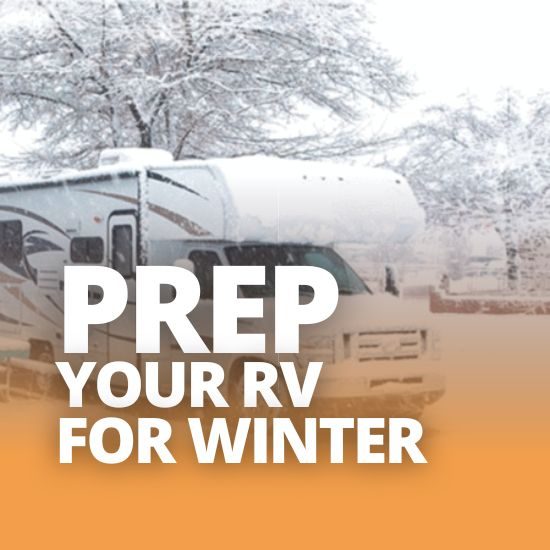
Prep your RV for winter
Getting your RV properly winterized and ready for seasonal storage is crucial! Check out these essential tips.
1. Clean your RV’s exterior surfaces
Exposure to sunlight can cause a lot of hazards in the long run. It can fade your RV’s paint job and do damage to its rubber and vinyl components. To help prevent this, wash your RV before storing it.
2. Reseal any tears, cracks, or openings along with the trim and roof of your RV
It doesn’t take much for the smallest opening to create a world of trouble. If left undetected and untreated, water leaks can create mildew, mould, and even structural damage to your unit. If you discover any cracks or holes in your RV’s trim, seal them properly before putting it in storage. (Make sure to use recommended sealants. Ask’s us by calling us or emailing us here)
Here’s a tutorial on why and how to seal your RV roof: https://youtu.be/mycfd8B-1ow
3. Leave rooftop vents open
Don’t like the musty smell of a dank basement? You can eliminate this unwanted odor by leaving your RV’s overhead vents opened a crack (make sure you have a vent cover installed overtop to keep the weather out)
4. Screen or cover any vent or pipe openings to the outside
Overlooking these areas is an open invitation to any pest large enough to infiltrate. Place special fly screens over appliance and gas vents, and pipe ends, to block pesky insects like wasps. Use expanding foam or silicone to plug openings underneath your RV to keep out rodents.
5. Remove any articles that pests might use for food or nest material
This is super important! Let’s face it, pests will not be attracted to an environment that is inhospitable to their needs, so make sure there are no traces of any items such as food, toilet paper, newspapers, soap, cleaning rags, etc. Also, pack up and remove any fabric items like towels, sheets, or blankets.
For your peace of mind, we can rodent-proof your unit. Call us toll-free at +1 855-685-8900 or click here to email us.
6. Security is important when you store your RV
Getting a specialty lock designed for your RV type is a smart investment and acts as an effective theft deterrent. Thieves tend to look for the easiest targets, so make sure your unit utilizes a security device. Choose a storage facility with onsite security features, like surveillance cameras and high-powered outdoor lighting. Additionally, you should also keep appropriate insurance on your vehicle, in case anything happens to it while it’s in storage.
7. Inflate your tires to the recommended maximum pressure
Alberta winters can be hard on tires. Inflate them to the pressure recommended by the manufacturer and cover them to avoid prolonged exposure to sunlight. Give your tires a good soapy wash to get rid of the build-up they’ve acquired on the road.
8. Close the window shades
Prolonged exposure to the sun can leech the colors right out of your unit’s interior fabric, such as carpets and upholstery. Simply closing the daylight shades shields your vehicle from the sun’s rays.
9. Keep your cabinets and closets open
You should also prop open your refrigerator door, while you’re at it. Leaving doors and drawers open helps prevent moisture and mould buildup while you’re away. Placing a box of baking soda inside the fridge for odor control isn’t a bad idea either.
10. Take out any items from your RV which can freeze
Remove items like liquid soap, water bottles, soda pop, cleaners, etc., to prevent potential damage and messy clean-ups.
11. Run antifreeze through your RV’s plumbing
During the winter in Canada, temperatures can be expected to fall below zero just about anywhere. So as a precaution, it’s a good idea to run some antifreeze through your RV’s plumbing, including valves and drain traps (don’t forget to purge your city water line and drain your water heater).
Don’t want to do it yourself? It takes us between 20-40 min to get it done. Call us to book your appointment (we’ll even give you a complimentary roof inspection to make it worth your while).
12. Shut off the supply valve(s)
Double-check all the gas appliances and turn them off.
13. Remove your RV’s batteries
It’s important not to allow your batteries to freeze, so disconnect them and store them safely above ground in a dry, separate area with a heat source.
On a final note, it’s still a good idea to go and check on your trailer or motorhome every once in a while, just to make sure everything is in order. This is especially true if you’re storing outdoors. After all, security cameras onsite won’t be able to alert you to things like a slow tire leak or minor damage caused by a storm. You’ll also want to verify that there are no unexpected moisture leaks or pest infiltration that occurred during your absence, so be on the lookout for signs of chewing, droppings or water intrusion inside your RV.